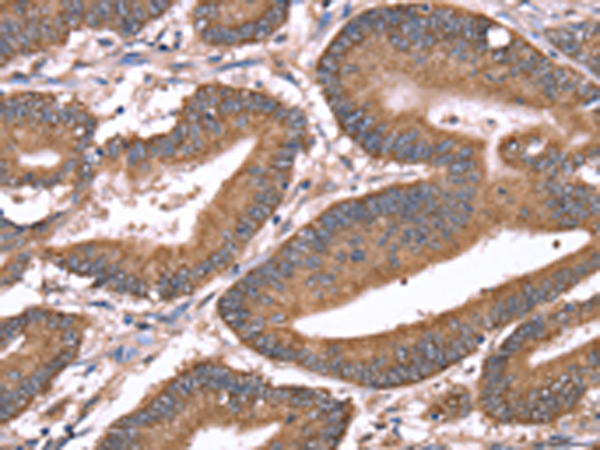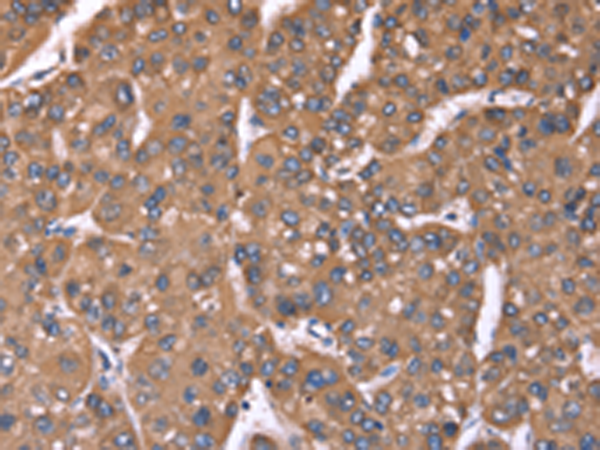

| WB | 咨询技术 | Human,Mouse,Rat |
| IF | 咨询技术 | Human,Mouse,Rat |
| IHC | 1/50-1/200 | Human,Mouse,Rat |
| ICC | 技术咨询 | Human,Mouse,Rat |
| FCM | 咨询技术 | Human,Mouse,Rat |
| Elisa | 1/2000-1/10000 | Human,Mouse,Rat |
| Aliases | HPRG; HRGP; THPH11 |
| Host/Isotype | Rabbit IgG |
| Antibody Type | Primary antibody |
| Storage | Store at 4°C short term. Aliquot and store at -20°C long term. Avoid freeze/thaw cycles. |
| Species Reactivity | Human |
| Immunogen | Synthetic peptide of human HRG |
| Formulation | Purified antibody in PBS with 0.05% sodium azide and 50% glycerol. |
+ +
以下是关于SLC12A6抗体的3篇文献示例(内容为虚构模拟,仅供参考):
1. **文献名称**:*Expression and localization of the K+-Cl− cotransporter SLC12A6 in the developing mouse brain*
**作者**:Howard, E. et al.
**摘要**:本研究通过免疫组化技术结合特异性SLC12A6抗体,揭示了该蛋白在小鼠胚胎及出生后脑组织中的动态表达模式,提示其在神经元迁移和突触形成中的潜在作用。
2. **文献名称**:*Functional characterization of SLC12A6 mutations in Andermann syndrome using custom-generated antibodies*
**作者**:Delpire, E. & Mount, D.B.
**摘要**:作者开发了针对SLC12A6的兔源多克隆抗体,并在患者来源的细胞模型中验证了致病突变导致的蛋白表达异常,为Andermann综合征的分子机制提供了实验证据。
3. **文献名称**:*SLC12A6-mediated ion transport in peripheral nerve myelination: Insights from antibody-based inhibition assays*
**作者**:Karadsheh, M. et al.
**摘要**:利用SLC12A6特异性抗体阻断其功能,研究发现该蛋白缺失会导致施万细胞离子稳态紊乱,进而影响周围神经髓鞘形成。
(注:以上文献为示例,实际引用请通过PubMed或SciHub等平台检索真实发表论文。)
The SLC12A6 antibody is a tool used to detect the solute carrier family 12 member 6 (SLC12A6) protein, also known as potassium-chloride cotransporter 3 (KCC3). This transmembrane protein, encoded by the *SLC12A6* gene, plays a critical role in regulating intracellular chloride and potassium ion homeostasis, particularly in neurons and peripheral nerves. It facilitates electroneutral ion transport, contributing to cell volume regulation and neuronal excitability. Dysfunction of SLC12A6 is linked to neurological disorders, including Andermann syndrome (a rare autosomal recessive condition characterized by agenesis of the corpus callosum, peripheral neuropathy, and developmental delays) and other neuromuscular pathologies.
SLC12A6 antibodies are widely utilized in research to investigate the protein's expression, localization, and functional interactions. They are applied in techniques such as Western blotting, immunohistochemistry, and immunofluorescence to study tissue-specific distribution, particularly in the nervous system. Studies using these antibodies have revealed SLC12A6's involvement in axonal maintenance, synaptic function, and osmoregulation. Additionally, the antibody aids in exploring disease mechanisms, such as how SLC12A6 mutations disrupt ion transport, leading to neurodegeneration. Its role in cancer cell migration and epilepsy has also been investigated, highlighting its broader physiological relevance. Validated antibodies are essential for distinguishing between SLC12A6 isoforms and assessing post-translational modifications, contributing to targeted therapeutic research.
×